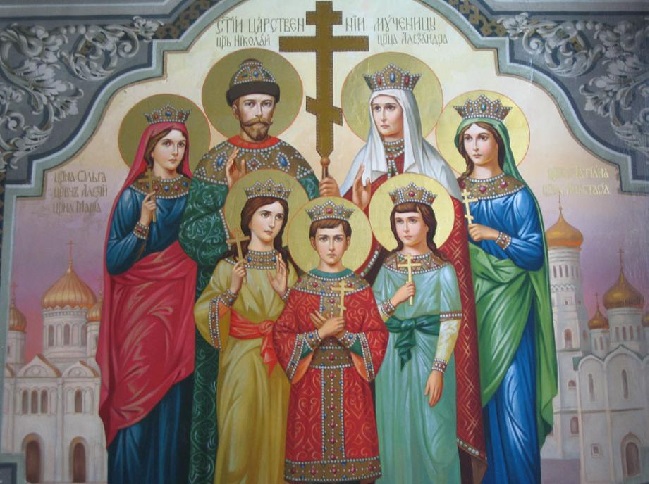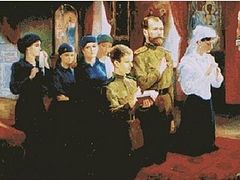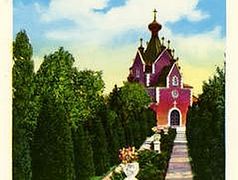
Question: "Is monarchy the only form of government man can institute that represents both the fullness of the Orthodox faith and the Incarnational reality of Christ?"
If we go back to the Old Testament, there was a time when God ruled the people of Israel through prophets and judges, such as Moses and Samuel, who were specially called by Him. Toward the end of the life of the Prophet Samuel, the people of Israel asked him to anoint a king for them, so that they could be like all the other nations, and no longer dependent on God raising up a judge to lead them, and we are told:
But the thing displeased Samuel, when they said, Give us a king to judge us. And Samuel prayed unto the Lord. And the Lord said unto Samuel, Hearken unto the voice of the people in all that they say unto thee: for they have not rejected thee, but they have rejected me, that I should not reign over them (1 Samuel 8:6-7).
So one could argue that the most ideal form of government is a theocracy, but as the history of Israel up to this point demonstrated, such a theocracy only worked out well for the people when they were zealous to obey God, which very often was not the case. So monarchy is perhaps the second best system of government, but not one without problems ... because for monarchy to work out well, you need a king that is pious. God warned Samuel, and through Samuel, the people, of the downside of having a king:
And [Samuel] said, This will be the manner of the king that shall reign over you: He will take your sons, and appoint them for himself, for his chariots, and to be his horsemen; and some shall run before his chariots. And he will appoint him captains over thousands, and captains over fifties; and will set them to ear his ground, and to reap his harvest, and to make his instruments of war, and instruments of his chariots. And he will take your daughters to be confectionaries, and to be cooks, and to be bakers. And he will take your fields, and your vineyards, and your oliveyards, even the best of them, and give them to his servants. And he will take the tenth of your seed, and of your vineyards, and give to his officers, and to his servants. And he will take your menservants, and your maidservants, and your goodliest young men, and your asses, and put them to his work. He will take the tenth of your sheep: and ye shall be his servants. And ye shall cry out in that day because of your king which ye shall have chosen you; and the Lord will not hear you in that day. Nevertheless the people refused to obey the voice of Samuel; and they said, Nay; but we will have a king over us; that we also may be like all the nations; and that our king may judge us, and go out before us, and fight our battles (1 Samuel 8:11-20).
The subsequent history of Israel, and then then the divided kingdoms of Israel and Judah show that some kings lived up to the ideal of faithfulness to God, and functioned as icons of Christ, but more often then not, they fell short of this—and sometimes they were more like foreshadowings of the antichrist. King David was the best example of a righteous King—and he not only served as an image of the future Messiah, but it was from his line that the Messiah would actually come.
With the coming of Christ and the spread of the Christian Faith, there were kingdoms that became Christian, and so looking to the example of King David, the Church anointed them to rule as Christian monarchs. We have many examples of such kings that are now reckoned as saints of the Church, and when you had a pious king who was also a capable ruler, you had the best examples of Christian government we have ever seen. Unfortunately, the combination of piety and competence is something that was not invariably found in such monarchs.
So is monarchy superior to democracy? St. John of Kronstadt once observed "Hell is a democracy but heaven is a kingdom." However, we live in a representative democracy that has afforded us freedom of religion—and we are grateful for that. But on the other hand, we have also begun to see in recent years that the problem with democracy is that it only works well for a moral people, and given fallen human nature, it can facilitate a rapid decline in morality. The 20th century, especially in the wake of the two world wars, saw the rise of democracy around the world and the rapid decline in monarchy, and in the course of just under a hundred years we have essentially seen the end of Christendom as a result.
In 2 Thessalonians, St. Paul spoke about the great falling away and the coming of the antichrist:
Let no one deceive you by any means; for that Day will not come unless the falling away comes first, and the man of sin is revealed, the son of perdition, who opposes and exalts himself above all that is called God or that is worshiped, so that he sits as God in the temple of God, showing himself that he is God. Do you not remember that when I was still with you I told you these things? And now you know what is restraining, that he may be revealed in his own time. For the mystery of lawlessness is already at work; only he who now restrains will do so until he is taken out of the way (2 Thessalonians 2:3-7).
So what is the restraining force that holds back the mystery of lawlessness, but will be taken away? St. John Chrysostom and other fathers say that this was the Roman Empire (see Homily 4 on 2 Thessalonians). Now many, especially Protestants, might be inclined to dismiss this interpretation, but consider the words of the noted Protestant New Testament scholar and theologian George Eldon Ladd:
"The traditional view has been that the restraining principle is the Roman empire and the restrainer the Emperor. This view, or a modification of it, fits best into the Pauline theology. In Romans 13:4, Paul affirms that the ruling authority (even though it be pagan Rome is God's servant for your good" (A Theology of the New Testament (Grand Rapids: Eerdmans, 1974), p. 560).
The Roman Empire is usually said by westerners to have ended in 476. The East Roman empire continued on until the fall of Constantinople in 1453. However, the Russian Empire, which continued both the religious and political tradition of Christian Rome, continued until 1917, and so it may be that this marks the beginning of the removal of this restraining force. It certainly marked the beginning of both rapid moral decline as well as a time of martyrdom which has surpassed the worst persecutions of the early Church in intensity. Of course, we cannot say for sure that the end has come until we see Christ return.
But while democracy may not be an ideal form of Christian government, since we have the right to vote, we should exercise what influence for good we can and assert our rights as citizens, as St. Paul, who was a Roman citizen, often did.
See also: The Mystery Of The Anointed Sovereigns Tsar Nicholas II & Tsarina Alexandra of Russia




